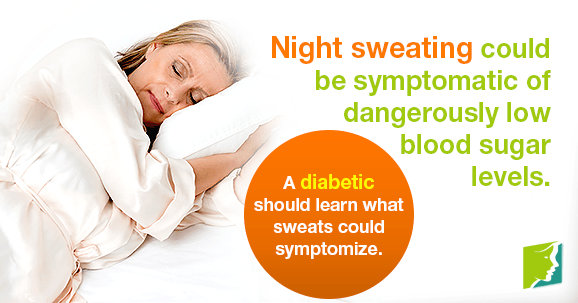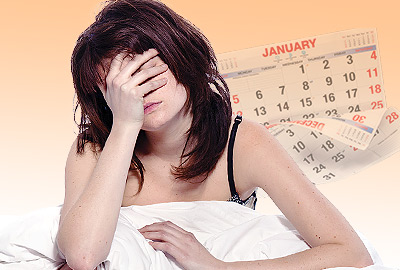Diabetes is a lifelong condition, characterized by a person having blood sugar levels that are higher than normal. There are two strands of the condition - type 1 and type 2 - and in both types, night sweat episodes may symptomize abnormally low blood glucose levels. These should always be dealt with immediately, because potential consequences range from disorientation to loss of consciousness, or even death. Read on to learn more about diabetes, how diabetes can be a night sweats trigger, and how to efficiently restore low blood sugar levels.
What Is Diabetes?
The pancreas gland behind the stomach produces insulin, a hormone that controls glucose levels in the blood and enables the conversion of glucose into energy for the healthy functioning of the body. Diabetics produce insufficient amounts of insulin or insulin that doesn't function properly, which means they are unable to convert glucose into energy naturally. Type 1 diabetes is usually diagnosed during childhood and is controlled by regular insulin injections to replace that which the body cannot produce; type 2 is more commonly associated with adults and obesity, and is managed with a healthy diet and tablets.
Part of managing diabetes responsibly means being aware of the symptoms that indicate a change in blood sugar levels in the body.
Hypoglycemia
For a diabetic, night sweat episodes could be indicative of hypoglycemia. Hypoglycemia is defined as a severe lack of energy caused by abnormally low blood sugar, when glucose levels drop to between three to four millimoles per liter (mmol). Hypoglycemia can occur when a diabetic has taken too much insulin, skipped a meal, or exercised too hard without replenishing lost energy levels.
During the day, feeling hungry, dizzy, and shaky are all fairly noticeable symptoms of hypoglycemia, but during the night, low blood glucose levels are more difficult to detect, as the person is usually asleep. Night sweating is one of the clearest nocturnal indicators of hypoglycemia; if nightwear and bed sheets are soaked in sweat upon waking, especially when accompanied with a sense of tiredness, confusion, and a headache, a diabetic should seek to restore lost glucose levels as a matter of urgency.
Responding to Hypoglycemia
The longer hypoglycemia is left undealt with, the more debilitating symptoms will become, with extreme cases resulting in loss of consciousness. Drinking a glass of fruit juice or eating a glucose tablet will most immediately and efficiently replace lost glucose levels. After this, consuming slower energy-releasing carbohydrate foods, such as a whole-grain sandwich, will restore sugar in the blood more consistently.
It's vital that diabetics regularly check their blood sugar levels and learn to notice the symptoms of blood abnormalities. If you have diabetes, be aware of factors that affect glucose levels, such as alcohol intake and exercise. Avoid skipping meals, and make sure to carry glucose tablets to restore sugar levels efficiently. Inform your loved ones and colleagues about the condition and how to respond in an emergency; it is reassuring and comforting to know that you have their support. Check out tips about sugar and night sweats.
Sources
- Diabetes UK. (n.d). Nocturnal Hypoglycemia-Night Time Hypo. Retrieved February 11, 2014, from http://www.diabetes.co.uk/nocturnal-hypoglycemia.html
- Diabetes UK. (n.d). What Is Type 1 Diabetes? Retrieved February 11, 2014, from http://www.diabetes.org.uk/Guide-to-diabetes/What-is-diabetes/What-is-Type-1-Diabetes/
- Natural Health Service UK. (2012). Diabetes. Retrieved February 11, 2014, from http://www.nhs.uk/Conditions/Diabetes/Pages/Diabetes.aspx
- Natural Health Service UK. (2013). Hypoglycaemia. Retrieved February 11, 2014, from http://www.nhs.uk/conditions/hypoglycaemia/Pages/Introduction.aspx




